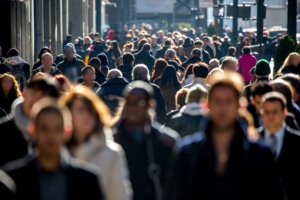Are the French prepared to sacrifice local public services on the altar of budget savings? Who do they trust to improve the situation in their region: local elected officials or the State? Do rural dwellers feel neglected by public authorities in comparison with city dwellers? Six months ahead of the 2026 municipal and inter-communal elections, an Ifop survey carried out for Intercommunalités de France sheds valuable light on the relationship between the French and local public action. Conducted online between September 10 and 12, 2025, among a representative sample of 2,000 people, the survey highlights a deep attachment to the local level, particularly in rural areas, against a backdrop of budget restrictions and the weakening of public services.
Key survey figures
1. Half of rural dwellers (50%) feel that their region does not benefit from government action – twice as many as residents of the Greater Paris region (20%).
2. Two-thirds of French people (67%) feel that public authorities do not pay enough attention to rural communities
3. A clear majority of French people (63%) disapprove of the budget cuts imposed on local authorities.
4. Priority is largely given to reducing State spending (91%), far ahead of local authorities (47%) and social spending (52%).
5. But at local level, the demand for lower taxes is also on the rise, even if it means cutting back on public services (47% vs. 38% in 2024).
6. A majority of French people feel that public health services have deteriorated in recent years (61% for everyday medicine and 57% for emergency services), a sentiment that has risen sharply since 2017 (+16 and +19 points).
7. The French trust local authorities more than the government to solve problems, whether in managing public finances (44% vs. 22% for the State) or meeting everyday needs (68% vs. 8%).
8. Local political figures such as the mayor (68%) and the president of the intermunicipal authority (57%) inspire confidence in a majority of respondents.
Survey findings
A) A STRONG FEELING OF ABANDONMENT OF THEIR TERRITORY AMONG FRENCH PEOPLE LIVING IN RURAL AREAS
The feeling that one’s territory is being neglected by the public authorities remains widespread in France, particularly in rural areas. More than one in three French people (37%) consider that the territory where they live « does not benefit from the action and presence of the public authorities ». This level, virtually unchanged since 2017, bears witness to a persistent territorial divide. The evolution is almost zero (+1 point in eight years), a sign that the actions carried out over the past decade have not mitigated this feeling of abandonment. This feeling is much more pronounced in rural France. In fact, half (50%) of the inhabitants of communities of communes now feel that the public authorities are not doing enough to help their area. This is much more than in towns and cities, where this feeling remains in the minority. The territorial contrast is striking: the more rural and remote from urban centers, the more the inhabitants express the absence of public power. Generally speaking, the French feel that rural areas are the most neglected by public action. This observation transcends political divides, although it is particularly acute within certain electorates (for example, 83% of Marine Le Pen voters feel that the State does not pay enough attention to rural communes). This reveals a strong demand for territorial solidarity in favor of « rural France », which feels forgotten in relation to « urban France ». However, this is not the only blind spot perceived by the French: almost one in two (49%) feel that the State does not pay enough attention to overseas territories, and four out of ten feel the same about working-class suburbs (42%). Conversely, more than half of French people (53%) feel that the public authorities are looking after Paris and the Greater Paris Metropolis « too much ». However, this feeling of abandonment has fallen sharply since 2017 in most of these territories (-20 points for rural communes, -18 for the suburbs, and -13 for overseas France).
B) THE FRENCH DON’T WANT BUDGET CUTS TO WEAKEN THE LOCAL LEVEL, ESPECIALLY IN RURAL AREAS
Against this backdrop, the French do not want efforts to reduce public spending to result in a weakening of the local level, particularly in already fragile rural areas. When asked about the government’s recent austerity measures for local authorities, they expressed a clear rejection: 63% of French people disapprove of the budgetary measures for local authorities (€5.3 billion cut in subsidies proposed by François Bayrou). In other words, almost two-thirds of the population disapprove of these budget cuts, which are likely to lead to a deterioration in local services. This rejection is consistent with the overall attachment to local public services: one person in two considers it a priority to maintain these services throughout the country, even if it means raising taxes, rather than closing facilities to reduce debt. Admittedly, this proportion was higher in 2017 (58%), indicating that in eight years, the principle of unconditionally maintaining local public services has eroded somewhat. The rise in concerns about public debt and tax pressure, particularly highlighted by François Bayrou during his time at Matignon, may have made some French people more receptive to budgetary arguments. Indeed, 85% of French people consider the issues of controlling public spending and reducing public debt to be priorities. However, 91% consider it a priority to reduce State spending, compared with a minority (47%) for local authorities. This demonstrates the attachment of a majority of French people to the power of local elected representatives to act, particularly when it comes to public services. On the ground, this opposition to local austerity is particularly strong in sparsely populated areas that depend on local services. Inhabitants of rural communities – where there is a combination of feelings of abandonment and a scarcity of services – are the most worried about cuts in local authority resources. Conversely, in large urban centers with better infrastructure, the prospect of reducing local public spending is a little more readily accepted, with the population slightly more inclined to think that savings can be made without too much impact on daily life. On the other hand, when the choice is put to the local level, opinions are increasingly divided between improving local public services, even if it means paying higher taxes, or lowering taxes, even if it means cutting back on services. The balance is even tipping in favor of lower taxes: 47% of French people would now prefer lower local taxes at the cost of reduced services (compared with only 38% in 2024). This shift, in just one year, demonstrates a significant rise in fiscal concerns, possibly fueled by inflation and the context of budgetary rigor, but the fact remains that almost a third of French people (33%, only 3 points less than in 2024) continue to choose the opposite option, wishing first and foremost to improve local public services, even if this means contributing more. Rural areas undoubtedly remain the most attached to their local services, while urban dwellers – particularly the wealthy and older urban dwellers – show themselves to be more sensitive to tax pressure (we note, for example, that 53% of those aged 65 and over favor lower local taxes). The differences between regions thus reflect different priorities depending on the local experience: lowering taxes in urban areas where the supply of services remains abundant, as opposed to maintaining a network of public services in rural areas where they are most needed. Against this backdrop of tensions over public services, health appears to be at the heart of French people’s concerns for their region. A majority of French people feel that access to ordinary healthcare and emergency infrastructures has deteriorated over the last ten years (61% and 57% respectively, 16 and 19 points higher than in 2017), a feeling that is widespread across all types of territory, from communities of communes to metropolises (excluding the Greater Paris Metropolis).
C) CONFIDENCE IN LOCAL ELECTED REPRESENTATIVES ON THE RISE
The French put their trust in local elected representatives to improve things, far ahead of national elected representatives. Generally speaking, local elected officials (mayors, presidents of intercommunalités, etc.) enjoy a higher level of trust than national players in developing public services and ensuring territorial cohesion. French people’s confidence in local elected representatives has even risen sharply since 2017, regardless of the stratum studied. In fact, the president of an intermunicipal authority is the one whose confidence has risen most sharply (+10 points). The survey confirms that in 2025, as in 2017, citizens will clearly prefer « local » rather than « central » to take effective action close to home. This preference for the local level is particularly evident among those most dependent on local services: the elderly, for example, overwhelmingly trust local authorities rather than the government to meet their day-to-day needs (72% of those aged 65 and over say so). Overall, the French seem to perceive their mayors and local councillors as better able to understand the realities on the ground and to provide solutions, where central government action is deemed too distant or less efficient. This confidence in local players is a priority throughout the country, albeit with some nuances. In small communes and rural communities of communes, the figure of the mayor and local elected representatives inspires an almost instinctive confidence, inherited from a tradition of daily proximity to constituents. Even the younger generations, who are sometimes perceived as distant from local politics, share this sentiment: 67% of the under-25s say they trust the president of their intercommunal community to develop public services and territorial cohesion – a high figure which suggests that the intercommunal level is gradually taking root in people’s minds as a relevant level of public action. Conversely, in large conurbations and metropolises, confidence in local elected representatives is somewhat more moderate: the relative anonymity and complexity of these vast territories can weaken the bond of trust, and a significant proportion of metropolitan dwellers retain expectations of the central state. Nevertheless, in every type of territory, local authorities are ahead of the government in terms of citizens’ trust when it comes to reducing territorial inequalities and ensuring quality public services. In 2025, more than ever, the cornerstone of French confidence lies at local level, close to the daily lives of residents, which sends out a strong message in the run-up to municipal and inter-municipal elections.
Ifop’s point of view:
In short, the Ifop-Intercommunalités de France survey of September 2025 highlights an apparent paradox: on the one hand, France’s rural and peri-urban territories, which loudly express a feeling of abandonment, and on the other, citizens who are generally attached to their local public services (health, etc.) and inclined to praise the action of their local elected representatives. Faced with budgetary challenges and territorial fractures, the local level is seen by the French as essential to maintaining quality of life and cohesion in all areas. Mayors and intercommunal presidents, in the front line, are more than ever hopeful of bridging the gap between neglected rural areas and urban centers deemed dynamic.
François Kraus, Director of the « Politique/Actualités » department
Léo Major, Research Manager, « Politique/Actualités » Department




